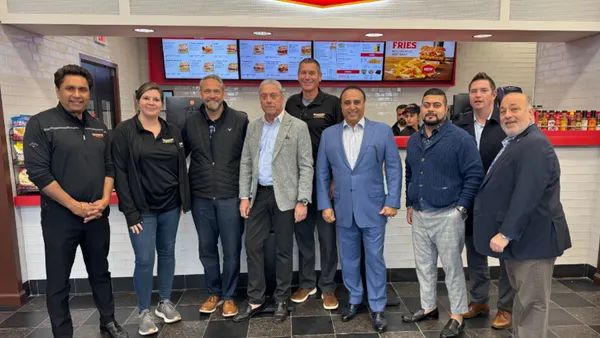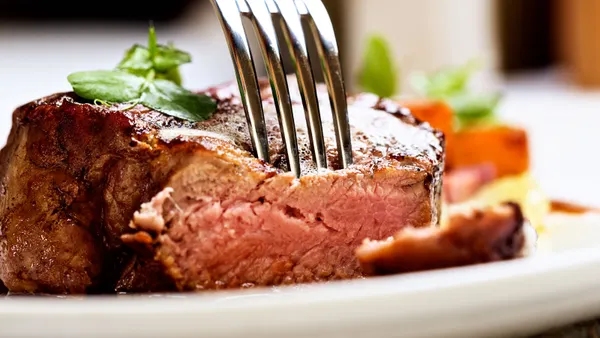Chick-fil-A has flown to rank among the top QSR brands this year, with over $10 billion in estimated annual sales despite its limited regional focus. The chain continues to grow despite facing negative publicity over its donations to anti-LGBTQ groups and bans by several municipalities.
It has grown so much in the last few years that even McDonald's franchisees have expressed concerns over the chicken chain's rapid expansion. Despite this, analysts don't expect the brand to attempt to overthrow the Golden Arches anytime soon. In the U.S., McDonald's restaurant system is three-times the size of Chick-fil-A's, Aaron Allen, CEO of Aaron Allen & Associates, told Restaurant Dive.
"[Chick-fil-A doesn't] need to have a 100% to market to be so successful," Andrew Selepak, director of the Master of Arts in Mass Communication Program at the University of Florida, told Restaurant Dive. "You can have a niche market and still make plenty of money."
For Chick-fil-A, that niche has been chicken sandwiches — a differentiator that had largely been unchallenged until recently, Selepak said. It was a relatively unique product and few popular QSRs had a chicken sandwich that came close. McDonald's attempted a Southern Style Chicken in 2014 that had similar ingredients, including a fried chicken breast and pickle, but received bad reviews. Even when Popeyes issued its challenge to the brand with its own chicken sandwich, Popeyes ran out of the product, leading to a lot of unhappy customers and overworked staff.
When Popeyes rolled out its sandwich the second time after two months of preparation, customers still had to endure long waits in-store and at the drive-thru and staff were still overworked and unfriendly — a far cry from Chick-fil-A's customer service quality, Selepack said.
"[Chick-fil-A] feels almost more like a local establishment than a national chain with their customer service, and I think that is a big part of their brand," he said.
And the customer service will likely continue to be the brand's top selling point — the chain won high marks for both brand intimacy and brand personality this year.
"[Chick-fil-A] feels almost more like a local establishment than a national chain with their customer service, and I think that is a big part of their brand."

Andrew Selepak
Director of the Master of Arts in Mass Communications Program, University of Florida
The drive-thru has also been a major part of the company's success. Average unit volumes are over $4 million, and can process a hundred cars in an hour, Allen said. This volume has been particularly essential in Chick-fil-A's success, he said.
Its simplistic menu also makes it easier for staff to prepare meals quickly, Selepak said.
Even though the company has one of the slowest drive-thru times in the country, it has the most cars in line, according to QSR Magazine.
"You have long lines because customers like your products that much," Selepak said. "That can be looked at more as a positive than a negative."
The brand also hasn’t been as aggressive with tech adoption as others have been. It hasn't yet adopted digital menu boards like McDonald's and other QSR brands, for example. But at the same time, the lack of consumer-facing technology could work in favor of Chick-fil-A, Allen said.
"I think that's where you can argue both ways in terms of technology getting in the way of the experience and then missing the boat on things that could be disruptive," Allen said.
The types of technology it has adopted improves the customer experience, such as dine-in mobile app ordering and AI to track potential food safety issues.
Brand loyalty continues to insulate the chain from bad press
While Chick-fil-A's popularity among customers is a positive for the brand, it faces many challenges as it grows. The company has built such a loyal following that even when it is up against negative publicity and faces bans in certain markets, it can still continue to grow, Selepek said.
A test of a location in England will not be extended beyond six months due to the chain's anti-LGBTQ stance, for example. The chain announced in November that the Chick-fil-A foundation, its philanthropic arm, will no longer donate to anti-LGBTQ organizations and has cut ties with the Fellowship of Christian Athletes and the Paul Anderson Youth Home. Still, its past donations could continue to influence consumer perception of the brand.
Despite these challenges, the company has plenty of room to grow. Even as it eyes international markets, Chick-fil-A has a lot of domestic growth potential and has been expanding into new markets, making a splash in adding new metro areas like Chicago and New York, Allen said.
Even as it grows, Chick-fil-A's ongoing success will ride on its ability to be consistent, said Selepak.
"I think it's just very successful because people know what they are going to get, they like what they are going to get and they keep going back for it," Selepak said.


 Read more
Read more






